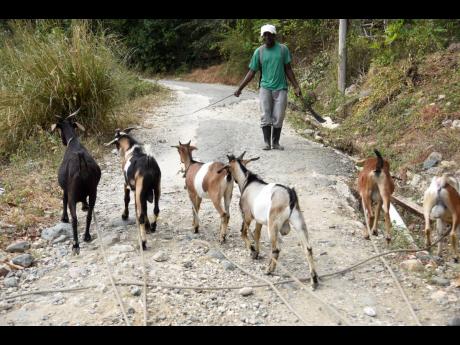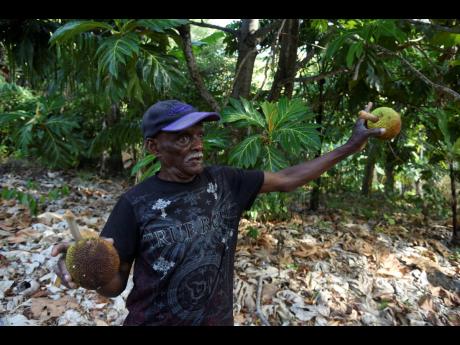‘If it wasn’t for the drought, you’d find it fresh and green’
JAS wants more long-term investment to fix water issues as farmers rack up losses
Every morning for the last four weeks, Ronald Osbourne gets up early and sets out with his goats in Font Hill, St Thomas, in search of feeding options for them as a prevailing drought has parched his regular pastures.
The livestock farmer explained that this is the only way he can ensure that his animals get fed.
“Mi nuh have a personal land fi myself, and di few piece weh mi occupy, it dry; nothing is on it,” he said. “Mi haffi just let dem go and just walk behind dem mek dem gwaan pick pick the dry grass, the dry leaves, and dem find likkle green sumn weh dem feed pon otherwise, like gungo,” he said.
Jamaica has been experiencing a reduction in rainfall since October last year, which has since worsened, with preliminary results for February showing that last month may have seen less than 30 per cent of the 30-year average. The agriculture industry is particularly susceptible to adverse weather conditions.
Osbourne, who also raises cows and pigs, told The Gleaner that he has been a livestock farmer since he was a teenager. He said he is especially concerned about the impact the season will have on those animals and has opted to sell them.
“Di drought a kill mi, man, so mi haffi a sell out and keep few likkle ones weh mi can monitor,” he said.
Feeling helpless, the 52-year-old farmer lamented that there is little he can do during the drought, which he said has progressively got worse.
Amos Dobbs, an 80-year-old farmer from Lloyd, also in St Thomas, shared the same sentiment.
“Sometimes you find like January, February, a few years ago, we get rain right through, almost, but for now, that change,” he said.
Holding two stunted breadfruits in his hands, the farmer reminisced about days when the farm he has been tending to for two decades would be bountiful with the crop, which would be sold to higglers heading to the market.
“If it wasn’t for the drought, you’d find it fresh and green,” he said of the farm on which plantains, coconuts, and breadfruit are grown.
Sharing that he has heard the concerns of farmers islandwide, last Friday, Agriculture Minister Pearnel Charles Jr announced a $110 relief fund for the sector. This he said is in addition to $90 million that was previously allocated for water trucking and other measures.
The minister said that the Government has been working assiduously to navigate the water challenges in the agriculture sector, which involved canals and pipeline rehabilitation, the conversion of surface irrigation to pressurised systems, the rehabilitation of wells, and the extending of their opening hours. The Government, he said, has also purchased a 4,000-gallon truck to support its fleet and is working to increase its water-harvesting ponds.
“All of this is important to us to make sure that we are working together to build resilience and to expand and fast-track our efforts to efficiently utilise our water resources and improve the access to water, and importantly for us in agriculture, to improve irrigation and moisture-conservation systems,” he said.
He also stated that a comprehensive $4.4 billion plan is in place for irrigation systems.
But Lenworth Fulton, president of the Jamaica Agricultural Society, in highlighting that the agriculture industry contributes 7.3 per cent to the country’s gross domestic product, told The Gleaner that greater priority must be placed on how that is sustained during these periods.
And while he lauded the “good efforts”of the minister, he contends that more long-term investment plans need to be actioned.
“We are doing well with tourism, and why? Because we borrow the money and build three good airports, and we build the shipping port from Port Royal, to Port Antonio, to Falmouth, and they’re paying back for the investment, so these little bits of things cannot suffice,” he said.
“All in these dry and arid areas, somewhere in these parishes, we have water running all to waste. We have not made the investment we should make in getting water to people,” he said.
Fulton charged the Government to develop water-channel systems to combat this yearly problem.
In the meantime, he said the drought is already causing an increase in food prices as crops and livestock wilt under the impact of the drought.
“We are losing the Irish potato crop, if we haven’t lost it already. The onions and yams [are] under threat. Dasheen [and] banana have suffered immensely just the same. So we have got a lot work to do, so let’s pray for some rain,” he told The Gleaner earlier this week.
“Forty per cent of broiler meat comes from small farmers. We import more beef than we produce, which we can reverse, but they need water to both grow the grass and feed the animals and the same for pigs and goats,” said the JAS president.


